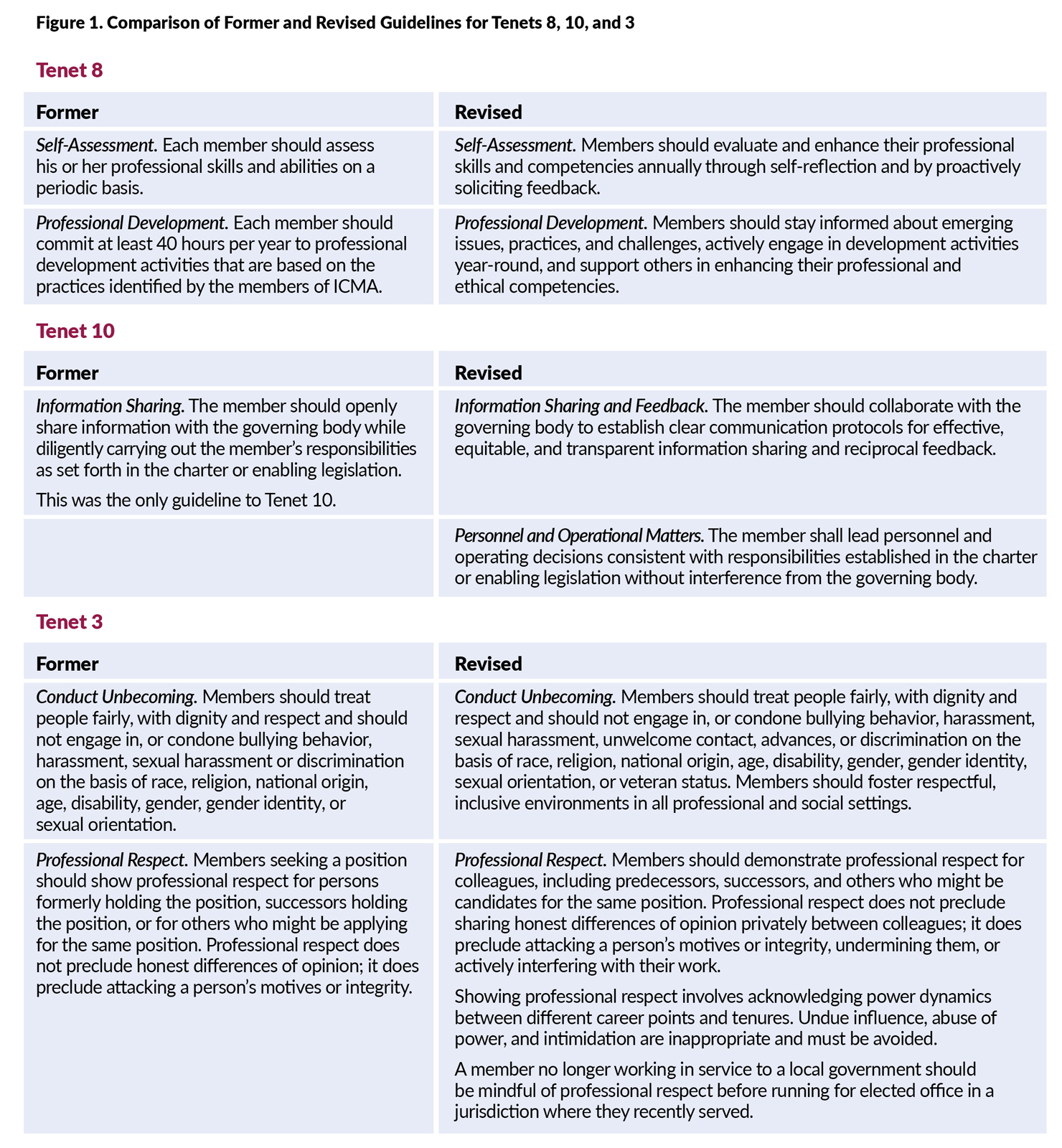
The year 2013 was the year of the book, Lean In: Women, Work, and the Will to Lead; the iPhone 5s; the word “selfie” went into the dictionary; and when ICMA’s Code of Ethics review cycle first began!
Ensuring the Code’s relevance for all members working in service to a local government had been an ad hoc effort up until that point, with just a few revisions from 1924 through 1998.
ICMA’s Committee on Professional Conduct (CPC) is a standing committee of the Executive Board (board). The CPC developed a plan to review a few principles of the profession at a time by engaging the membership through feedback on what works, what is missing, and what should be revised. This comprehensive effort had never been done before, and it was responsible to assess it just as local governments do for their own policies.
ICMA’s Constitution requires members vote by ballot to change the Code’s tenet language; the board has the authority to revise tenet guidelines, and this usually occurs at the CPC’s recommendation. As background, the tenets express the values of the local government management profession while the guidelines assist members in understanding their ethical obligations as outlined in the tenet.
Through at least 103 sessions, 11,000 member engagements such as attendance at a discussion or via written comments, and more than 10 feedback surveys, we have completed the review of all 12 tenets of the Code and their associated guidelines with the membership!
Concluding the Review with Tenets 8 and 10
This past 14 months, the CPC completed the final two tenets for membership review: Tenet 8 (professional development) and Tenet 10 (job interference). The CPC facilitated conversations with members during the Local Government Reimagined Conferences and state association meetings, then invited all members to share feedback through a survey.
The CPC drafted proposed revisions and surveyed the membership again. The CPC further refined the tenet language, and members who responded to the final survey supported the CPC’s proposed changes to Tenets 8 and 10. The board approved placing the revisions on the May 2025 ICMA annual election ballot. Members overwhelmingly voted in favor of the revisions to Tenet 8 (95% approval) and Tenet 10 (87% approval). The following is the updated Tenets 8 and 10 language:
Tenet 8. Continually improve professional capabilities and those of others while fostering growth and development through ethical leadership and effective management practices.
Tenet 10. Oppose efforts to interfere with professional responsibilities by consistently executing official duties, policies, and processes with an unwavering commitment to unbiased public service.
Updated Guideline Language for Tenets 3, 8, and 10
Based on member discussion at eight conferences and via three online surveys, the CPC drafted proposed revisions to Tenets 8 and 10 guidelines, then the board voted to approve them. Members responding to the final survey approved the proposed guideline language. (For Tenet 8, 85% Self-Assessment and 81% Professional Development; and for Tenet 10, 81% Information Sharing and Feedback and 83% Personnel and Operational Matters). The comparison between the former and revised/current guideline language can be seen in Figure 1.
The CPC also received significant feedback about revisiting Tenet 3’s guidelines on Professional Respect and Conduct Unbecoming. The language of Tenet 3 is “Demonstrate by word and action the highest standards of ethical conduct and integrity in all public, professional, and personal relationships in order that the member may merit the trust and respect of the elected and appointed officials, employees, and the public.”
These two guidelines warranted review because they have been cited in ethics complaints, i.e., unsolicited public commentary about a colleague’s organization; managers whose conversations with governing body members and staff without informing their colleagues had the effect of undermining their successors; running for elected office in retirement in the community where the member recently served; and unprofessional conduct at work events. The comparison between the former and revised/current guideline language can be seen in Figure 1.

These revisions mark the completion of the Code review effort. A complete history of the Code can be found here.
I’d like to extend a big thank-you first to our members for providing thoughtful feedback and suggested revisions to make sure the CPC and board got it right! I share congratulations especially to current and former CPC and board members for prioritizing this when there are many other issues competing for their time. ICMA’s former managing director of member services and ethics, Martha Perego, spearheaded the initiative for many years and the profession extends a big thanks for her leadership in ensuring the Code stays relevant for the next generation of local government practitioners.

JESSICA COWLES is ethics director at ICMA (jcowles@icma.org).
New, Reduced Membership Dues
A new, reduced dues rate is available for CAOs/ACAOs, along with additional discounts for those in smaller communities, has been implemented. Learn more and be sure to join or renew today!
